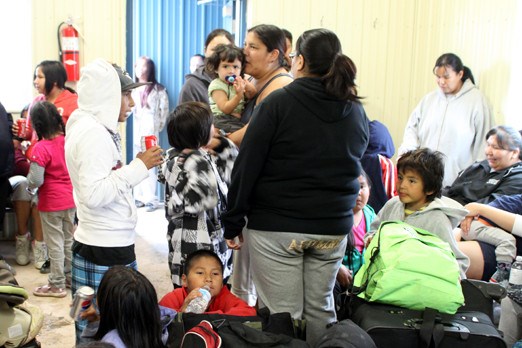Kenny Meekis doesn’t know where he and his family are going or how long they’ll have to leave their home, but he knows he needs to leave Deer Lake First Nation.
“It’s too smoky. My kids are getting sick,” said the father of two.
With his son in his arms and his wife and daughter at his side with their bags packed, Meekis and his family were just four of the dozens of people crowded into Deer Lake’s small airport terminal waiting to be evacuated because of smoke from nearby forest fires Thursday afternoon.
Deer Lake, located 180 kilometres north of Red Lake, was issuing a phase one evacuation Thursday of about 500 people. Seniors, young children and their families and people with respiratory problems were boarding Hercules planes as they arrived in the remote community under some light rain.
Resource worker Gary Meekis said they were loading as many people as they could on each plane that landed.
“We don’t even know when we’re coming home; I hope everybody is well taken care of,” he said. “We don’t even know where we are getting sent. I think we might be all separated. I don’t know.”
There was a lot of emotion and commotion at the airport and Nishnawbe Aski Nation Grand Chief Stan Beardy said there was apprehension amongst the residents since they didn’t know where their families were headed.
People were also exhausted.
“It was really smoky here yesterday,” Beardy said. “The planes couldn’t really land, so everybody has to stay here the whole time because they don’t know when the planes will be able to come in. When the planes land, they don’t have much time. They just load up and take off again.”
With as many as 112 fires burning in Northern Ontario, thousands of people have been evacuated and 19 NAN communities are on high alert. Despite the chaos, Beardy said the coordination and efforts of countless people and organizations has been amazing.
“We’re talking about a few thousand people being mobilized,” he said. “I think it’s coming together.”
On Tuesday, Beardy called for help from the provincial and federal governments and said he feels they are stepping up.
“Initially we had problems locating aircraft but I think the federal government has come to our aid to make sure the people are moved out on a timely basis,” he said.
The fire situation in some areas of the North saw some relief Thursday with some rain and cooler temperatures. Robert Krause arrived from British Columbia Saturday with a contingent of firefighters to help the Ministry of Natural Resources and is the incident manager for the Sandy Lake and Deer Lake complex.
With 20 millimetres of rain in the past 24 hours, he said the blazes have been reduced to smoldering ground fires.
“Very little fire activity, not a lot of open flame,” he said. “The fires that are closest to the community, within the 16-kilometre area, are being held at this time and crews are mopping up and in some cases removing gear because we’re getting ready to call those fires out.”
Many firefighting personnel have already been moved to fires closer to Sandy Lake First Nation, Krause added.
“Currently we still have approximately 30 people working on the fires right here in the Deer Lake area as well as the incident management team of 22 people who are supervising a number of fires.”
